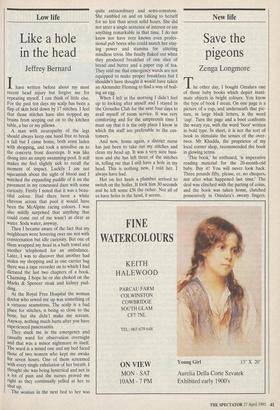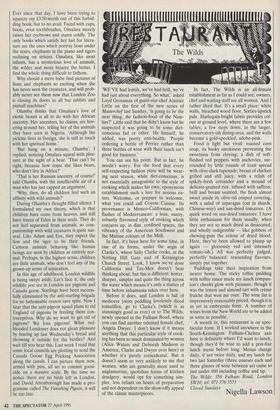New life
Save the pigeons
Zenga Longmore
The other day, I bought Omalara one of those baby books which depict inani- mate objects in bright colours. You know the type of book I mean. On one page is a picture of a cup, and underneath that pic- ture, in large black letters, is the word `cup'. Turn the page and a boot confronts the weary eye, with the word 'boot' written in bold type. In short, it is not the sort of book to stimulate the senses of the over- twos. Mr Khadda, the proprietor of my local corner shop, recommended the book in glowing terms.
`This book,' he enthused, 'is imperative reading material for the 20-month-old baby. Buy it! You will never look back. Three pounds fifty, please, er, no cheques, not after what happened last time.' The deal was clinched with the parting of coins, and the book was taken home, clutched possessively in Omalara's sweaty fingers. Ever since that day, I have been trying to squeeze my £3.50-worth out of this forbid- ding book, but to no avail. Faced with cups, boots, even toothbrushes, Omalara merely raises her eyebrows and stares coldly. The only books which satisfy her lust for litera- ture are the ones which portray lions under the stairs, elephants in the piano and tigers reclining on settees. Omalara, like most infants, has a mysterious love of animals, the wilder and more bizarre the better. I find the whole thing difficult to fathom.
Why should a mere babe find pictures of lions and elephants so exciting when she has never seen the creatures, and will prob- ably never see them now that London Zoo is closing its doors to all but rabbits and pinball machines?
Olumba thinks that Omalara's love of exotic beasts is all to do with her African ancestry. Her ancestors, he claims, are hov- ering around her, telling her of the animals they have seen in Nigeria. 'Although the pickine lives in foreign, she is still in touch with her spiritual home.'
`But hang on a minute, Olumba', I replied, noticing Omalara squeal with plea- sure at the sight of a bear. 'That can't be right, because how come she likes bears, who don't live in Africa?'
`That is her Russian ancestry, of course!' said Olumba, with the insufferable air of a man who has just capped an argument.
`Why, then, do all children feel such an affinity with wild animals?'
During Olumba's thought-filled silence I formulated my own theory, which is that children have come from heaven, and still have traces of Eden in their souls. They do not feel separated from animals, so com- panionship with wild creatures is quite nat- ural. Like Adam and Eve, they expect the lion and the tiger to be their friends. Cartoon animals behaving like human beings are seen by children as entirely nor- mal. Perhaps, in the highest sense, children are little animals, who don't feel any of the grown-up sense of separation. In this age of adulthood, London wildlife is being swept aside. Let's face it, the only wildlife you see in London are pigeons and Canada geese. Starlings have been success- fully eliminated by the anti-starling brigade for no fathomable reason save spite. Now I hear that the anti-pigeon squad plans to rid England of pigeons by feeding them con- traceptives. Why do we want to get rid of pigeons? We love pigeons! What red- blooded Londoner does not glean pleasure by tearing up last Wednesday's bread and throwing it outside for the birdies? And wait till you hear this. Last week I read that some local councils are plotting to send the Canada Goose Egg Pricking Association along the canals. I can picture them now, armed with pins, all set to commit goosi- cide on a massive scale. By the time we notice there are no birds left in London, and David Attenborough has made a pro- gramme called The Vanishing Pigeon, it will be too late.



















































 Previous page
Previous page